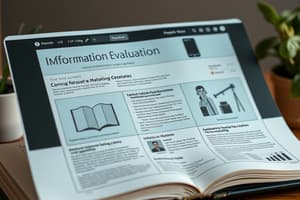Podcast
Questions and Answers
Media messages reflect the values and viewpoints of __________.
Media messages reflect the values and viewpoints of __________.
media makers
Individuals construct their own __________ from media.
Individuals construct their own __________ from media.
meanings
Media messages can be __________.
Media messages can be __________.
decoded
People interpret media differently based on their prior knowledge, experiences, values, and __________.
People interpret media differently based on their prior knowledge, experiences, values, and __________.
By deconstructing media, we can identify the __________ being used.
By deconstructing media, we can identify the __________ being used.
Media literacy helps people consume media with a __________ eye.
Media literacy helps people consume media with a __________ eye.
Media literate youth and adults are active __________ of media.
Media literate youth and adults are active __________ of media.
Responsible media production involves evaluating sources and understanding the __________ of media.
Responsible media production involves evaluating sources and understanding the __________ of media.
Everyone has their own point of __________.
Everyone has their own point of __________.
The role of media in democracy includes providing diverse __________ and keeping the public informed.
The role of media in democracy includes providing diverse __________ and keeping the public informed.
Study Notes
Understanding Media and Information
- Users must be able to read, deconstruct, and evaluate media contexts effectively.
Producing Media and Information
- Users should cultivate the ability to create, distribute, and publish ideas and information through various media.
Media and Information Literacy Goals
- Empowers individuals to exercise their right to free expression.
- Advocates for access to information and promotes the ability to evaluate content.
- Facilitates participation in governance, ensuring diverse voices are heard.
Media Literacy
- A 21st-century educational approach focused on accessing, analyzing, evaluating, and creating media messages.
- Utilizes persuasive techniques such as flattery, repetition, fear, and humor in messaging.
- Claims of truth in news and documentary films are often asserted but may not reflect complete realities.
- Fiction (novels, TV shows) aims for realism while advertisements create appealing fantasy worlds.
- Media can inspire unwise or harmful behaviors, highlighting the need for critical engagement with its content.
- Recognizes the interplay between fantasy and reality, aiding individuals in constructive integration.
Media Literacy: Basic Concepts
- Every media producer has a distinct viewpoint which influences the stories told.
- Media storytelling selectively highlights information while omitting others, shaping audience interpretation.
- Media messages consist of both texts (literal content) and subtexts (hidden meanings).
- Individual values and worldviews shape media communication choices, observable across all ages.
- People derive personal meanings from media based on their previous experiences, knowledge, and beliefs.
- Different interpretations can arise from the same media piece, underscoring subjective meanings.
Decoding Media Messages
- Deconstructing media allows identification of the creator's intent and the techniques employed.
- Analyzing elements such as language, untold narratives, texts, and subtexts aids understanding.
- Media literate individuals critically consume media, evaluating sources, purposes, persuasion, and deeper meanings.
Studying That Suits You
Use AI to generate personalized quizzes and flashcards to suit your learning preferences.
Related Documents
Description
Test your understanding of media and information literacy concepts, focusing on the ability to evaluate, deconstruct, and create media content. This quiz will assess your skills in analyzing media contexts and producing information effectively.




